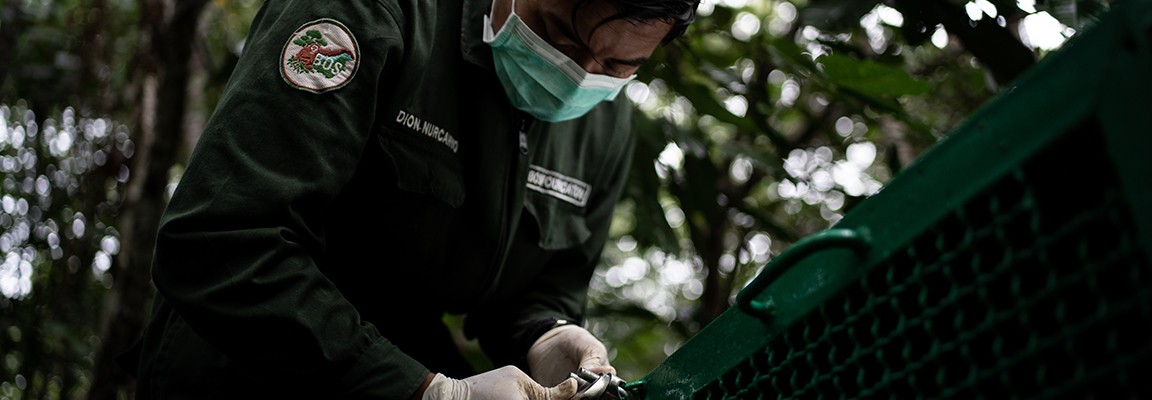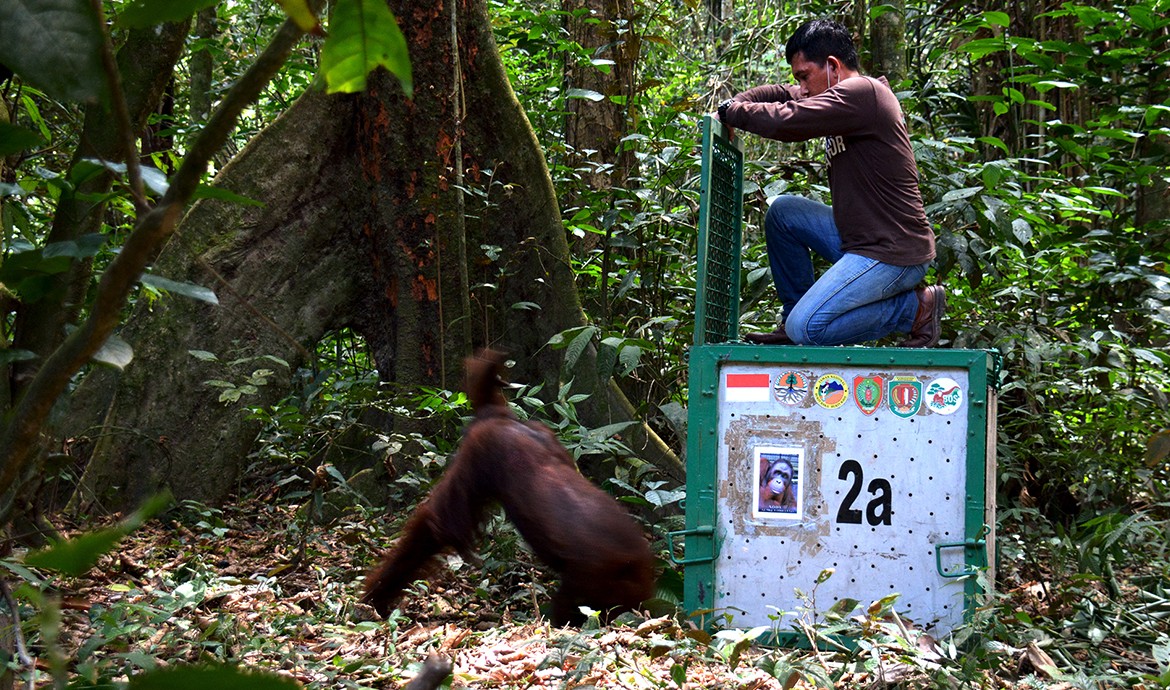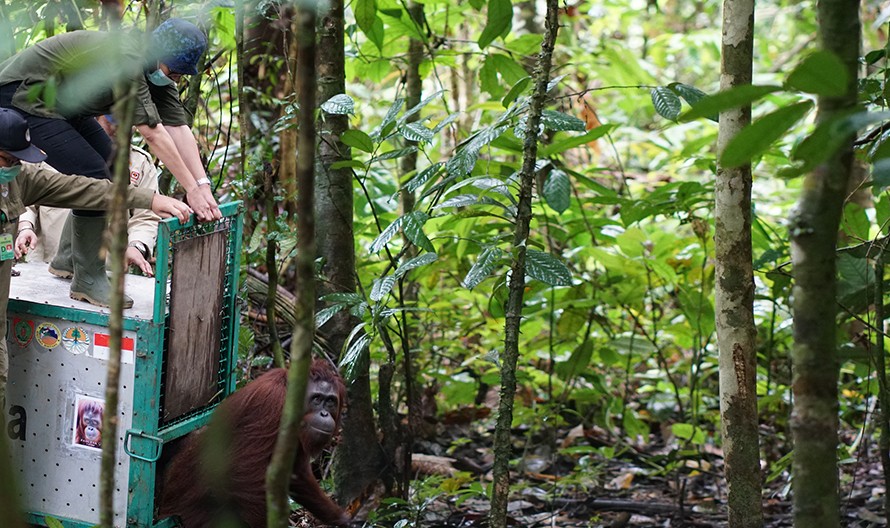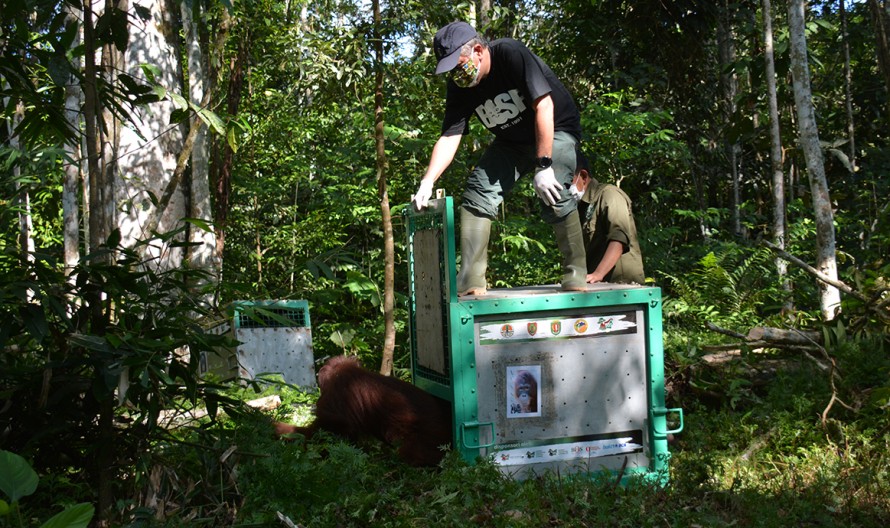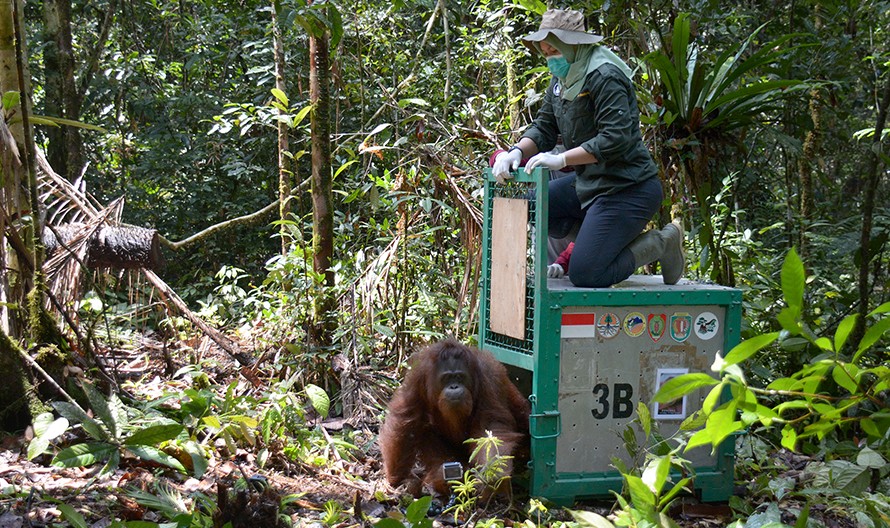The Republic of Indonesia’s Ministry of Environment and Forestry (KLHK) in cooperation with the Borneo Orangutan Survival (BOS) Foundation – winner of the 2017 Animalis Edition World Branding Award – and USAID LESTARI, releases four more rehabilitated orangutans to the Bukit Baka Bukit Raya National Park (TNBBBR) in Katingan Regency, Central Kalimantan. One of the orangutans to be released in this event, Pangkuy, was repatriated from Thailand in 2006.
The BOS Foundation’s Nyaru Menteng Orangutan Rehabilitation Centre continues to release ex-rehabilitated orangutans ready to live in the wild. Following two successful releases conducted in August, which saw 23 orangutans reintroduced to the natural forests of the TNBBBR, this particular event will release 4 female orangutans to the national park in Katingan Regency. The release will take the total rehabilitated orangutan population in the TNBBBR to 106, since the first event in August 2016.
One of the orangutans in this release, a female named Pangkuy, was repatriated from Thailand in 2006. That year, the Indonesian Government, through its Ministry of Environment and Forestry, repatriated 48 orangutans from Thailand, which were then entrusted to the Nyaru Menteng Orangutan Rehabilitation Centre, which has thus far managed to release three individuals to natural habitats, and Pangkuy is the fourth to have completed the rehabilitation program and released to the wild.
All four orangutans in this release are female; joining Pangkuy (17 years old) will be, Sisil (13), and mother-infant pair, Clara (12) and Clarita (1). The group will be dispatched from Nyaru Menteng on a 10-12-hour journey across both road and river to reach the predetermined release points in the TNBBBR.
DR. IR. JAMARTIN SIHITE, MSc., BOS Foundation CEO, said; «To receive and manage repatriated orangutans, all of which have been subjected to long periods of captivity, devoid of opportunities to develop natural skills and wild behaviours, is a considerable challenge for a rehabilitation centre. This is reflected in the low number of repatriated orangutans we have managed to release to the wild, despite more than 10 years of rehabilitation. This is a perfect example of how important strict law enforcement is to preventing, and eventually halting, the illegal wildlife trade.
«We cannot stress enough the importance of cooperation from all stakeholders; it is imperative for a successful orangutan and habitat conservation effort. Since we all benefit from the forest – which provides us with fresh air, clean water, forest products, and more – then we all must bear the responsibility. Our forests determine the quality of life for mankind, and as an umbrella species endemic to Sumatra and Kalimantan, orangutans play a vital role in helping maintain the quality of the forests on these islands. To allow such an environmentally-valuable species to become a victim of the illegal wildlife trade is simply irresponsible, and openly disregards the conservation work that others are working so hard to achieve. Let’s work even harder to protect orangutans and keep them in their natural habitats.»
IR. ADIB GUNAWAN, Head of the Central Kalimantan Natural Resources Conservation Agency (BKSDA) added; “Conservation is never an instant process. This is evident in the time that it takes to prepare an orangutan with a long history of captivity for release. The repatriated orangutan in this release has undergone 12 years rehabilitation. The amount of time and energy spent on getting her to this stage is astounding! This responsibility should not rest on the shoulders of the BKSDA, the government, and organisations like the BOS Foundation alone. Mass organisations and those from the business sector must also be actively involved.
The Indonesian government will continue to enforce the strict laws that were put in place to curb the international illegal wildlife trade. We have repatriated orangutans on more than four occasions - from Thailand, Kuwait, and Malaysia – yet the illegal wildlife trade persists. We desperately need support from all parties to shut down the perpetrators and their networks.
There is an urgent need for more global cooperation among stakeholders. In this release alone, there are several parties involved - the Central Kalimantan BKSDA; the TNBBBR authority; USAID LESTARI, and the BOS Foundation. To date, the cooperation among these four parties has resulted in 12 release events over the past two years, and the reintroduction of 106 orangutans to the TNBBBR. This is not a huge number, given the size and scope of Central Kalimantan. We, therefore, must work even harder to protect and preserve our environment and its biodiversity.»
IR. HERU RAHARJO, M.P., Head of the Bukit Baka Bukit Raya National Park (TNBBBR) Authority, added; «As an umbrella species that helps protect the habitat in which it occupies, and one that plays a significant role in forest maintenance, the orangutan is a vital part of our ecosystem. It is, therefore, imperative we protect orangutans! The Bukit Baka Bukit Raya National Park is a natural habitat that can suitably sustain a wild orangutan population. We ensure their safety here through security monitoring, evaluations, and periodical patrols. We sincerely hope that the released orangutans will produce new, healthy, wild orangutan populations in the national park.
Bear in mind, however, that the TNBBBR comprises only one small fraction of the total 93.6 million hectares of forest area in Indonesia. We need to also pay attention to other forest areas. Rehabilitated orangutans must be released to suitable forest areas located at the right altitude, with adequate forest food, a limited wild-orangutan population, and guaranteed, long-term security.»


